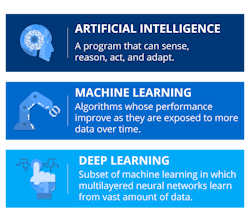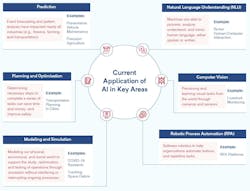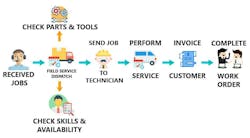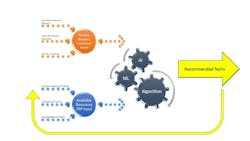By RAMEZ NAGUIB, President, Clima-Tech LLC
Imagine what you could accomplish if you had a team of colleagues you could lean on whenever you had to tackle a task that wasn’t in your wheelhouse, or whenever you got stuck, or whenever you needed a piece of information that wasn’t at your fingertips. Now imagine those colleagues were available whenever you needed them—and replied instantly!
Well, those colleagues are now here, in the form of generative A.I.'s that will be embedded into more of our work environment over the coming months and years.1
What is A.I.?
Artificial Intelligence (A.I.) is a machine’s ability to perform the cognitive functions we associate with human minds, such as perceiving, reasoning, learning, interacting with an environment, problem solving, and even exercising creativity.2
When companies today deploy artificial intelligence programs, they are most likely using machine learning — so much so that the terms are often used interchangeably, and sometimes ambiguously. Machine learning is a subfield of artificial intelligence that gives computers the ability to learn without explicitly being programmed.3
A.I. has stepped out of the realm of science fiction, and now we’re seeing it practically every day, across every industry.4
A.I. approaches that augment human capabilities can be very valuable in situations where humans and A.I. have complementary strengths. For example, an A.I. system might be better at synthesizing available data and making decisions in well-characterized parts of a problem, while a human may be better at understanding the implications of the data.
It is becoming increasingly clear that all stakeholders need to be involved in the design of A.I. assistants to produce a human-A.I. team that outperforms either alone.5
Examples of A.I. in the Field
Field service management (FSM) includes the detection of a field service need (through remote monitoring or other means, inspection or a customer detecting a fault), field technician scheduling and optimization, dispatching, parts information delivery to the field, and process support of field technician interactions.6
With automation and machine learning, the field service industry can save time and resources even as it helps predict potential issues. A.I.-enabled FSM can help:7
- To automate scheduling, dispatching, and route planning;
- Predict demand and optimize schedules by analyzing data from past service calls;
- Dispatch field service technicians automatically, based on skills, location, and availability;
- Improve decision-making regarding business-critical areas such as resource allocation, service level agreements, and pricing;
- Provide real-time insights about field service operations by monitoring field service technicians in real-time to identify issues and optimize routes.
Is A.I. expensive?
While training a complex ML algorithm can be expensive, it does not always need to be. There are many open-source tools and pre-trained ML models that lower the entry barriers for small and medium companies.
Furthermore, due to the current ‘A.I. hype’, companies often try to implement A.I. or ML at any cost, without understanding the business needs. In some situations, an intelligent automation or a simple regression model would suffice.8
Best practices for using generative A.I.9
Start inside. Before using generative A.I. to create customer- or other external-facing content, test extensively with internal stakeholders and employee use cases. You don’t want hallucinations to harm your business.
Prize transparency. Be forthcoming with people, whether they be staff, customers or citizens, about the fact that they are interacting with a machine by clearly labeling any conversation multiple times throughout.
Do your due diligence. Set up processes and guardrails to track biases and other issues of trustworthiness. Do so by validating results and continually testing for the model going off course.
Address privacy and security concerns. Ensure that sensitive data is neither input nor derived. Confirm with the model provider that this data won’t be used for machine learning beyond your organization.
Take it slow. Keep functionality in beta for an extended period of time. This helps temper expectations for perfect results.
Case Study
As a test case, we worked with an analytics and machine learning company to develop a dispatch optimization application. The objective was to recommend the most suitable technician for an incoming service request based on the history, location, and availability. The figure above shows the flow diagram for the process.
To test the accuracy of the application, we compared the recommendations of the algorithm to those of the most senior dispatchers. The recommendations matched up 80% of the time.
Conclusion
The modern toolbox for excellent field service must now also include A.I.-powered applications that enable field services organizations to deliver value at the speed of need. Businesses that utilize A.I.-powered field service delivery capabilities are most likely to win the battles -- for customer retention, customer love and advocacy, and for future business.
A customer-focused company is a company that delivers the best customer care. And the best customer care in today's economy is powered by real-time intelligence and personalization at scale.10
-------
Based in Los Angeles, Ramez Naguib is president of Clima-Tech LLC. He has worked on some of the largest refrigeration, central cooling, and heating projects around the world, and has published papers on engineering, economic and management topics. Email: [email protected].
-------
1 Alexandra Samuel. A Guide to Collaborating with ChatGPT for Work. WSJ.com, April 11, 2023;
2 What is AI? McKinsey & Company, April 24, 2023;
3 Sara Brown. Machine learning, explained. MIT Sloan School of Management. April 21, 2021;
4 Bernard Marr. 15 Amazing Real-World Applications of A.I. Everyone Should Know About. Forbes. May 10, 2023;
5 Michael L. Littman, et. al., “Gathering Strength, Gathering Storms: The One Hundred Year Study on Artificial Intelligence (AI100) 2021 Study Panel Report.” Stanford University, September 2021;
6 Field Service Management. Gartner Glossary. 2023;
7 A.I. in Field Service Management for Telecom Industry. Aspire Systems. 2023;
8 Sandra Topić. A.I.: separating facts from fiction, Oxford University - Saïd Business School, April 27, 2023;
9 Chris Howard. Gartner Experts Answer the Top Generative AI Questions for Your Enterprise, Gartner, 2023.
10 Vala Afshar. A.I. improves field service quality and customer experience. ZDNET. January 19, 2023.
####
About the Author
Ramez Naguib
Based in Los Angeles, Ramez Naguib is president of Clima-Tech LLC. He has worked on some of the largest refrigeration, central cooling, and heating projects around the world, and has published papers on engineering, economic and management topics. Email: [email protected].




